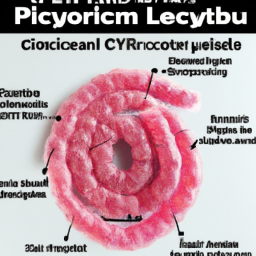Although approximately half of the human population is colonized by H. pylori, only about 10–20% are likely to develop peptic ulcer, and only 1–2% are at risk for either gastric cancer ormucosa-associated lymphoid tissue lymphoma.

How C-13 technology is applied in the testing technology of h-pylori? is it accurate?
2023-02-18
Read: Alternative therapies for Helicobacter pylori: probiotics and phytomedicine
2023-02-20Although approximately half of the human population is colonized by H. pylori, only about 10–20% are likely to develop peptic ulcer, and only 1–2% are at risk for either gastric cancer ormucosa-associated lymphoid tissue lymphoma.

Although approximately half of the human population is colonized by H. pylori, only about 10–20% are likely to develop peptic ulcer, and only 1–2% are at risk for either gastric cancer ormucosa-associated lymphoid tissue lymphoma.
-
Table of Contents
“Don’t let H. pylori colonize you – protect yourself from the risk of peptic ulcer, gastric cancer, and MALT lymphoma!”
Introduction
The human population is colonized by the bacteria Helicobacter pylori (H. pylori) in approximately half of the population. While this colonization can lead to a variety of gastrointestinal issues, only a small percentage of those colonized will develop peptic ulcer, and an even smaller percentage are at risk for gastric cancer or mucosa-associated lymphoid tissue lymphoma. This article will discuss the risk factors associated with H. pylori colonization and the potential health complications that can arise from it.
Exploring the Link Between H. Pylori and Mucosa-Associated Lymphoid Tissue Lymphoma
Mucosa-associated lymphoid tissue (MALT) lymphoma is a type of non-Hodgkin lymphoma that is associated with the presence of Helicobacter pylori (H. pylori) infection. This type of lymphoma is a rare form of cancer that affects the mucosal lining of the stomach and other organs. It is believed that H. pylori infection is a major risk factor for the development of MALT lymphoma.
The exact mechanism by which H. pylori infection increases the risk of MALT lymphoma is not fully understood. However, it is believed that the bacteria may cause chronic inflammation of the mucosal lining of the stomach, which can lead to the development of lymphoma. Additionally, H. pylori infection has been linked to an increased risk of other types of cancer, such as gastric cancer.
Studies have shown that H. pylori infection is associated with an increased risk of MALT lymphoma. In one study, researchers found that individuals with H. pylori infection were more than twice as likely to develop MALT lymphoma compared to those without the infection. Additionally, the risk of MALT lymphoma was higher in individuals with more severe H. pylori infection.
The link between H. pylori infection and MALT lymphoma is an important one, as it may provide insight into the development of this type of cancer. Further research is needed to better understand the exact mechanism by which H. pylori infection increases the risk of MALT lymphoma. Additionally, it is important to note that H. pylori infection can be treated with antibiotics, which may reduce the risk of MALT lymphoma. Therefore, it is important for individuals with H. pylori infection to seek medical attention and treatment.
Understanding the Risk Factors for Gastric Cancer Associated with H. Pylori Colonization
Gastric cancer is a serious and potentially life-threatening condition that affects the stomach. It is the fifth most common cancer worldwide and is associated with a number of risk factors, including Helicobacter pylori (H. pylori) colonization. H. pylori is a type of bacteria that can colonize the stomach and cause inflammation, which can lead to gastric cancer.
H. pylori colonization is a major risk factor for gastric cancer. It is estimated that up to 80% of gastric cancer cases are associated with H. pylori colonization. The risk of developing gastric cancer increases with the duration of H. pylori colonization. Studies have shown that individuals who have been colonized with H. pylori for more than 10 years are at an increased risk of developing gastric cancer.
In addition to the duration of colonization, other factors can increase the risk of developing gastric cancer associated with H. pylori colonization. These include age, gender, and certain genetic factors. Individuals over the age of 50 are at an increased risk of developing gastric cancer associated with H. pylori colonization. Men are also more likely to develop gastric cancer associated with H. pylori colonization than women. Certain genetic factors, such as mutations in the TP53 gene, can also increase the risk of developing gastric cancer associated with H. pylori colonization.
It is important to be aware of the risk factors for gastric cancer associated with H. pylori colonization. Individuals who are at an increased risk should be monitored closely and receive regular screening for gastric cancer. Treatment for H. pylori colonization can reduce the risk of developing gastric cancer. If gastric cancer is detected, early diagnosis and treatment can improve the chances of a successful outcome.
The Role of H. Pylori in the Development of Peptic Ulcers
Helicobacter pylori (H. pylori) is a type of bacteria that is found in the stomach and is associated with the development of peptic ulcers. Peptic ulcers are open sores that form in the lining of the stomach, small intestine, or esophagus. H. pylori is the most common cause of peptic ulcers, accounting for up to 90% of cases.
H. pylori is a spiral-shaped bacterium that is able to survive in the acidic environment of the stomach. It is believed that H. pylori is transmitted through contaminated food and water, or through contact with an infected person. Once it enters the stomach, H. pylori produces toxins that damage the protective mucous layer of the stomach and small intestine. This damage allows stomach acid to come into contact with the sensitive lining of the stomach and small intestine, leading to inflammation and the formation of ulcers.
In addition to causing ulcers, H. pylori can also increase the risk of developing stomach cancer. It is estimated that H. pylori is responsible for up to 70% of stomach cancer cases worldwide.
The diagnosis of H. pylori infection is usually made through a blood test, stool test, or breath test. Treatment typically involves a combination of antibiotics and medications to reduce stomach acid. In some cases, surgery may be necessary to remove the infected tissue.
In conclusion, H. pylori is a common cause of peptic ulcers and is associated with an increased risk of stomach cancer. It is important to be aware of the signs and symptoms of H. pylori infection and to seek medical attention if they occur. Treatment is available and can help to reduce the risk of complications.
Conclusion
In conclusion, although H. pylori colonization is common, only a small percentage of people are at risk for developing peptic ulcer, gastric cancer, or mucosa-associated lymphoid tissue lymphoma. Therefore, it is important to be aware of the risk factors associated with these conditions and to take steps to reduce the risk of developing them.
If you are concerned about the dangers of Helicobacter Pylori, take action now and learn more about how to keep away from it. Visit ETestMedical to find out more about the risks and how to protect yourself.



